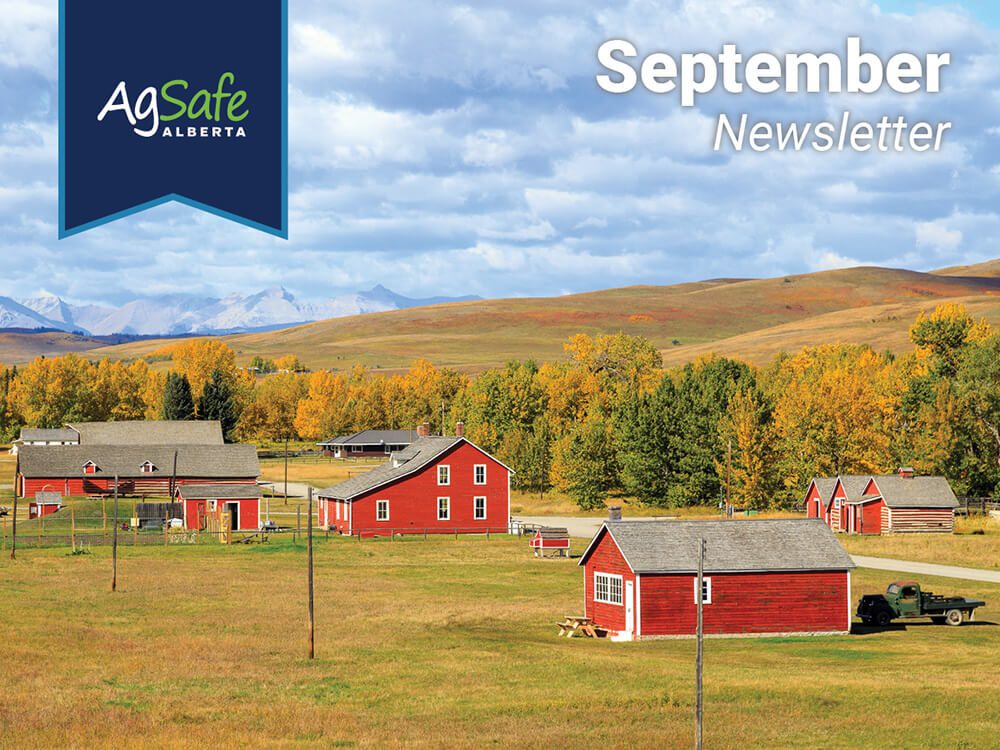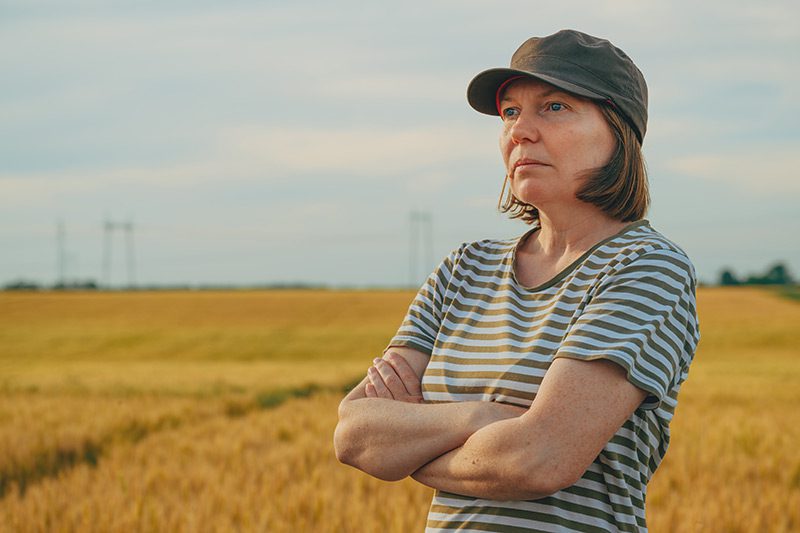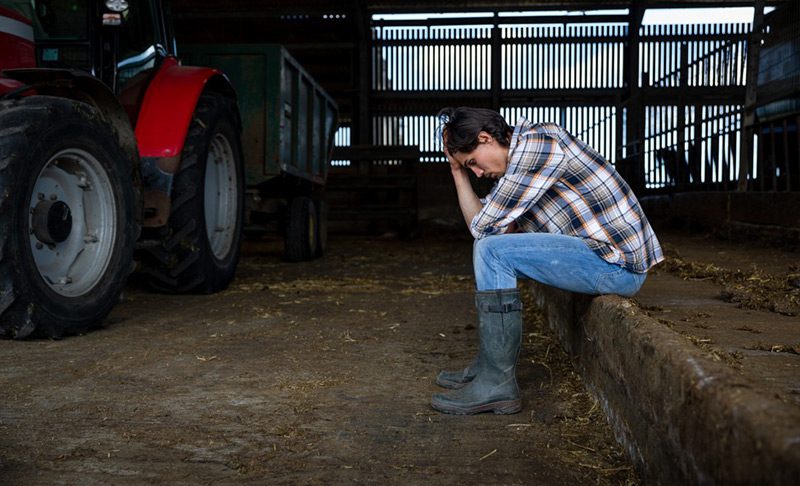

Egg Farmers of Alberta Champions First Aid Training for Farmers
The Egg Farmers of Alberta (EFA) recently hosted group first aid training sessions across the province to make it easier for members to gain life-saving skills and knowledge they can apply on the farm. To highlight this important initiative, AgSafe Alberta conducted two interviews: one with Jenna Griffin, Manager of Programs & Research at EFA, and another with Dan Entz, Egg Barn Manager at Twilight Colony and AgSafe Alberta Board Member.
Interview with Jenna Griffin, Manager of Programs & Research at EFA
AgSafe Alberta: How did the idea to organize group first aid training for members come up?
Jenna Griffin: Through our farm safety assessments, we identified a common gap: many producers didn’t have someone on-farm with valid, up-to-date first aid training. Addressing this need would help more farms meet safety benchmarks and successfully pass the EFA Farm Safety Assessment.
This idea was first discussed with AgSafe Alberta and gained momentum after a farmer reached out, explaining he couldn’t get approval to leave the colony for two full days to attend standard training. Hosting it as an EFA-organized event made participation more accessible while adding credibility and flexibility. We offered it as a blended workshop and provided staff support for registration and navigating the online modules. This was particularly helpful for participants less comfortable with online learning. Hosting sessions specifically for egg farmers also created a more familiar and supportive environment for attendees.
AgSafe Alberta: How did the farmers feel about the training?
Jenna Griffin: The feedback has been really positive. We were pleasantly surprised by the strong turnout, the number of people who completed the online portion and the level of engagement during the in-person sessions. Staff were present at each session to offer support, which also allowed us to demonstrate our own commitment to safety.
The group I participated in clearly saw the value and relevance of the training to their daily operations. One thing that stood out was a comment from the instructor: “You don’t do first aid because it’s a requirement, you do it as a commitment to the people at home you care about.” That really resonated with the group.
One participant mentioned how common burns are in their farm kitchen, which sparked a broader conversation about workplace hazards. This is tied directly to why we ask about WHMIS training and first aid kits during assessments. After the in-person session, one farmer even took the time to text a staff member to say how worthwhile the day had been. It felt like a meaningful step forward in building a strong culture of safety leadership.
AgSafe Alberta: What do you think the biggest wins from holding this group training were?
Jenna Griffin: Getting over 80 farmers to complete first aid training! Our field staff have been waiting until after this training is completed to conduct a 2025 Farm Safety Assessment. We think we will have a lot more farms passing.
AgSafe Alberta: Is there anything you would like to share that might be helpful for other groups who may want to do something similar?
Jenna Griffin: One key takeaway was that small, thoughtful adjustments (like offering blended training, support with online modules and a comfortable, peer-based setting) can make a big difference in uptake and completion. It was also helpful to position this as part of a broader safety strategy, not just a standalone requirement. We are still thinking through our role long-term in helping maintain the certificates by offering reminders regarding expiry and refresh sessions.
AgSafe Alberta: Do you have any last thoughts you would like to share?
Jenna Griffin: Kudos go to Carley Frerichs, who did the heavy lifting of organizing the training!
Interview with Dan Entz, Egg Barn Manager at Twilight Colony & AgSafe Alberta Board Member
AgSafe Alberta: As a producer, what were your thoughts on EFA organizing group first aid training for its members?
Dan Entz: I thought it was a great idea! With EFA organizing the training, it created an opportunity for more farms to attend. Also, as in my case, if the barn manager already had the training, they could send a barn helper instead if space was available.
AgSafe Alberta: How do you think first aid training benefits the egg barn, the individual who receives the training and even the colony as a whole?
Dan Entz: Working in a barn is no different than working elsewhere on the farm; you have risks and things can happen. Having first aid training, you feel more confident when people come to help. You hope never to use it, but knowing that you have first aid is reassuring.
My thoughts on having first aid training as an individual are very positive. Everyone wants to help others however they can—and what better way than having the knowledge to assist a family member, friend or colleague in a time of need? As an egg manager, it’s reassuring to know I can rely on my first aid training if something happens.
Our colony has a minimum of eight personnel with first aid training, and we took the courses at our local fire department, which is approved by the Canadian Red Cross. The reason the colony had us do that is that we understood the importance of having this training, especially since there are so many people working on one farm. It is beneficial for both smaller injuries (like something in your eye, cuts or scrapes) and the bigger things as well.
AgSafe Alberta: Is there anything else that you would like to add?
Dan Entz: First aid training is something that I think the whole farm can benefit from, and we hope to steer our younger generation in that direction.
First aid training for all farms is very beneficial, but it is a lot more effective if there are resources readily available, such as first aid kits and an AED unit. Getting all farm personnel trained on how to use and care for these kits and units is just as important. A first aid kit with missing supplies or an AED with dead batteries will disappoint you in your time of need.
The Egg Farmers of Alberta’s commitment to first-aid training reflects a broader dedication to safety, community and proactive leadership in agriculture. By making training more accessible, EFA has empowered over 80 farmers to take meaningful steps toward safer farms. The initiative not only strengthens individual confidence and preparedness but also fosters a culture where safety is seen as a shared responsibility. As Jenna Griffin and Dan Entz emphasized, the true value of first aid lies in its power to help others—on the farm and beyond. If you’re a farmer or part of an agricultural organization, consider organizing or participating in group first aid training. It’s a simple yet powerful way to build resilience, support your team and ensure your farm is ready for the unexpected.

If you have farm-specific health and safety questions or require support relating to health and safety on your farm, please contact AgSafe Alberta at info@agsafeab.ca.
You may be eligible for onsite farm visits and up to 10 hours of advisor support at no cost!

What to Expect from
an OHS Inspection
Have you ever wondered about what an OHS inspection would look like? Maybe you are not sure about what Alberta OHS officers do. The Government of Alberta has resources that can answer your questions on these and other topics. Simply click on the links below to lean more!
What to expect in an OHS inspection: Information for Employers
What to expect in an OHS inspection: Information for Workers
Role and duties of Alberta OHS Officers

Telling The Story Project: The Things Not Usually Talked About…
Nearly all of us will know someone who has been seriously injured or died while work was being done on the farm. Maybe one of us was involved in a farm incident ourselves. We all have our reasons for not talking about it, for not sharing what happened, for not wanting to think about how it could have been prevented. There are things that can be done to prevent these incidents from happening.
The Telling The Story Project shares personal stories and firsthand experiences so that others can learn from them and prevent similar incidents themselves. Below are links to just a few stories, however, you can visit the Telling The Story Project website to read more.
Telling the Story Project: Jerry and Julie
Telling the Story Project: Brian
Telling the Story Project: Jason and Roxanne
Telling the Story Project: Kenny
CONTACT US
